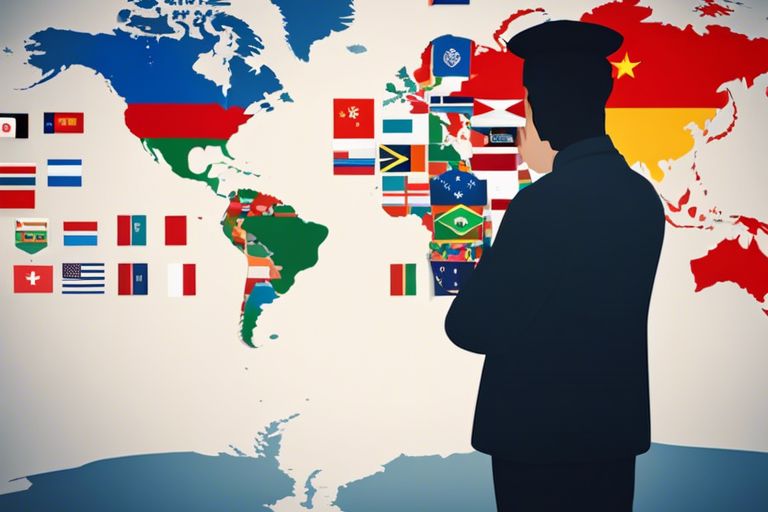Many aspire to become diplomats, representing their country’s interests and international policies. The path to becoming a diplomat, particularly a Foreign Service Officer (FSO), is unique and demanding. This guide will provide you with a comprehensive overview of the qualifications, skills, and steps required to begin on a career in diplomacy. From the selection process and necessary skills to the different career tracks and preparation tips, this guide will equip you with the knowledge you need to pursue a rewarding and impactful career as a diplomat.

Key Takeaways:
- Foreign Service Officer: Becoming a Foreign Service Officer (FSO) is a way to serve as an American diplomat, representing and promoting U.S. interests abroad.
- Skills and Qualities: Diplomats must possess skills like adaptability, cultural sensitivity, analytical thinking, and effective communication to excel in their role.
- Selection Process: To become an FSO, applicants must undergo a rigorous process including a written test, personal narrative, an oral interview, medical and security clearance review, and a final suitability review.
- Foreign Service Specialist: The U.S. Department of State also employs non-FSOs with specialized skills, such as doctors, security agents, and teachers, to work abroad alongside FSOs.
- Test Preparation: Prospective diplomats should stay informed about current events, read extensively, and be knowledgeable in areas like economics, history, politics, and world affairs to prepare for the FSO exam.
- Student Diplomats: The State Department offers internships and fellowships for students to gain hands-on experience and insight into a career in diplomacy.
- Exploring Career Paths: Aspiring diplomats can explore different career tracks within the State Department, meet with local diplomats, and use resources like the DoS Careers Mobile App to find the right fit for their interests and skills.
1. Meet eligibility requirements: high school graduate, at least 20.
2. Demonstrate skills and personal qualities needed to be diplomat.
3. Undergo rigorous selection process: test, personal narrative, interview.
4. Complete medical & security clearance review.
5. Prepare for career by staying informed on current events.
6. Consider internships or fellowships with State Department for experience.

Types of Diplomatic Careers
Some of the different types of diplomatic careers include roles as Foreign Service Officers (FSOs) and Foreign Service Specialists. Foreign Service Officers represent and further the interests and policies of the United States while serving overseas, while Foreign Service Specialists have specialized skills needed to keep foreign missions running smoothly.
| FSOs | Specialists |
| Represent the U.S. interests abroad | Have specialized skills (e.g., doctors, IT specialists) |
| Advance U.S. interests and promote peace | Support various functions in foreign missions |
| Undergo a rigorous selection process | Selected through a separate process |
| Must demonstrate strong leadership and language skills | Job roles vary but are crucial for mission success |
Career Tracks for Foreign Service Officers (FSOs)
Even as a Foreign Service Officer, there are various career tracks you can choose from such as Political, Economic, Consular, and Public Diplomacy. Each track offers unique opportunities to serve and represent the United States abroad, catering to your specific interests and skills.
Specialized Roles: Foreign Service Specialists
Roles within the Foreign Service Specialist category are crucial for ensuring the smooth operation of foreign missions. With specialized skills in diverse fields such as healthcare, technology, security, and education, these specialists play a vital role in supporting the overall diplomatic efforts of the United States and providing crucial services to citizens abroad.
Required Qualifications and Skills
Education and Skill Requirements
Now, assuming you aspire to become a diplomat, it is imperative to meet certain educational and skill requirements. A high school diploma is the minimum educational qualification, but possessing a strong foundation in subjects like economics, political science, world history, and foreign languages can provide a competitive edge. Diplomats must also possess strong analytical, organizational, and leadership skills, along with effective communication abilities.
Personal Qualities of a Successful Diplomat
To excel as a diplomat, individuals need to demonstrate a distinct set of personal qualities. The ability to remain calm under pressure, think on one’s feet, and adapt to diverse cultural settings is crucial. Diplomats must exhibit high integrity, resourcefulness, and creativity in problem-solving. Moreover, effective verbal and written communication skills, along with good judgment, play a significant role in diplomatic success.
Step-by-Step Guide to Becoming a Diplomat
| All Information | Details |
| Preparing for the Application Process | Information about what is needed to prepare for applying to become a diplomat |
| Navigating the Examination and Selection Procedures | Details on the steps involved in the examination and selection process |
Preparing for the Application Process
If you’re interested in becoming a diplomat, start by familiarizing yourself with current world events and suggested reading materials. Prospective diplomats should gather knowledge on topics like world affairs, economics, history, public affairs, and management. The Foreign Service Officer Test covers various subjects such as communication, economics, political science, and more. Building a solid educational foundation and staying informed are crucial to prepare for the application process.
Navigating the Examination and Selection Procedures
Application Process – The examination and selection procedures for becoming a diplomat involve several stages. This includes a written Foreign Service Officer Test, a personal narrative submission, an oral interview with role-playing exercises, and a medical and security clearance review. Applicants go through a rigorous selection process before being placed on the Registrar of selected candidates eligible for a position in the U.S. Foreign Service. Successful candidates must demonstrate skills in communication, problem-solving, and cultural adaptability, among others, to navigate this process successfully.
Tips for Aspiring Diplomats
Many individuals aspire to become diplomats, representing their country’s interests abroad. Here are some key tips to help you on your journey:
How to Gain Relevant Experience
Clearly, gaining relevant experience is crucial for aspiring diplomats. Consider internships at embassies or international organizations, volunteer work in multicultural environments, or language immersion programs. Building a strong foundation of experience in areas such as international relations, political science, and foreign languages will greatly benefit your career as a diplomat.
Strategies for Passing the Foreign Service Officer Test (FSOT)
One key strategy for passing the Foreign Service Officer Test (FSOT) is to thoroughly prepare by familiarizing yourself with the test format and content. Reviewing topics such as economics, political science, and world history will help you excel. Additionally, practicing with sample questions and seeking guidance from current diplomats or test preparation resources can increase your chances of success on the exam.
Test takers must be well-informed on a wide range of topics, including communication, economics, political science, and world history. The test covers areas such as management principles, mathematics, and statistics, so thorough preparation is imperative for success.
Factors to Consider Before Choosing a Diplomatic Career
To pursue a career in diplomacy, it is crucial to carefully consider various factors that will impact your life and work. From lifestyle and personal commitments to the pros and cons of diplomatic service, understanding these aspects will help you make an informed decision about a diplomatic career.
Lifestyle and Personal Commitments
An important aspect to consider before initiateing on a diplomatic career is the lifestyle it entails. Diplomats often have to relocate frequently, adapting to new cultures and environments. This can be challenging for individuals with strong ties to their current location or personal commitments that may be difficult to maintain while serving abroad.
The Pros and Cons of Diplomatic Service
| Pros | Cons |
| Opportunity to represent your country | Frequent relocations may disrupt personal life |
| Engage in international diplomacy | High levels of stress and pressure |
| Travel to various countries | Lack of stability in a long-term living situation |
| Chance to make a significant impact on global affairs | Security risks in some assignments |
Recognizing both the advantages and challenges of a diplomatic career is important to making an informed decision about pursuing this path.
Final Words
As a reminder, becoming a diplomat through the Foreign Service is a unique and challenging career path that requires a combination of skills, knowledge, and personal qualities. From passing rigorous exams to demonstrating effective communication and problem-solving abilities, aspiring diplomats must be prepared for the demanding selection process. Whether pursuing a career as a Foreign Service Officer or a Specialist, individuals interested in diplomacy should stay informed, gain relevant experience, and consider internships to get a glimpse of the diplomatic world in action. By following the comprehensive steps outlined in this guide, you can begin on the journey to becoming a diplomat and representing the interests of the United States on the global stage.
FAQ – Ultimate Guide to Becoming a Diplomat
Q: What is the role of a diplomat?
A: The role of a diplomat is to represent and further the interests and policies of their country while serving overseas, promoting peace, supporting prosperity, and protecting citizens while advancing national interests.
Q: What is a Foreign Service Officer (FSO)?
A: A Foreign Service Officer (FSO) is a career diplomat who serves as an American representative abroad, engaging in diplomacy to advance U.S. interests and maintain diplomatic relations with other countries.
Q: What skills are required to become a diplomat?
A: Diplomats need to have strong analytical, organizational, and leadership skills, as well as good judgment, high integrity, effective communication abilities, adaptability, and the capacity to work with diverse cultures.
Q: What is the process to become a Foreign Service Officer (FSO)?
A: To become an FSO, one must undergo a rigorous selection process that includes a written Foreign Service Officer Test, a personal narrative, an oral interview with role-playing exercises, and a medical & security clearance review.
Q: Can non-FSOs work as diplomats?
A: Yes, the U.S. Department of State also employs non-FSOs with specialized skills such as doctors, nurses, IT specialists, security agents, engineers, and teachers, who work abroad alongside Foreign Service Officers.
Q: How can one prepare for a career in diplomacy?
A: Prospective diplomats can prepare by staying informed of current events, following suggested reading, gaining a solid education, engaging in internships or fellowships, and developing a strong understanding of world affairs.
Q: What career tracks are available for Foreign Service Officers?
A: Foreign Service Officers can choose from various career tracks such as political, economic, public diplomacy, management, consular, and more, depending on their interests and skill sets.
Applicable in All World Countries listed below.
Afghanistan, Albania, Algeria, Andorra, Angola, Antigua and Barbuda, Argentina, Armenia, Australia, Austria, Azerbaijan, Bahamas, Bahrain, Bangladesh, Barbados, Belarus, Belgium, Belize, Benin, Bhutan, Bolivia, Bosnia and Herzegovina, Botswana, Brazil, Brunei, Bulgaria, Burkina Faso, Burundi, Cabo Verde, Cambodia, Cameroon, Canada, Central African Republic, Chad, Chile, China, Colombia, Comoros, Congo, Costa Rica, Côte d’Ivoire, Croatia, Cuba, Cyprus, Czech Republic, Denmark, Djibouti, Dominica, Dominican Republic, East Timor (Timor-Leste), Ecuador, Egypt, El Salvador, Equatorial Guinea, Eritrea, Estonia, Eswatini, Ethiopia, Fiji, Finland, France, Gabon, Gambia, Georgia, Germany, Ghana, Greece, Grenada, Guatemala, Guinea, Guinea-Bissau, Guyana, Haiti, Honduras, Hungary, Iceland, India, Indonesia, Iran, Iraq, Ireland, Israel, Italy, Jamaica, Japan, Jordan, Kazakhstan, Kenya, Kiribati, Korea, North, Korea, South, Kosovo, Kuwait, Kyrgyzstan, Laos, Latvia, Lebanon, Lesotho, Liberia, Libya, Liechtenstein, Lithuania, Luxembourg, Madagascar, Malawi, Malaysia, Maldives, Mali, Malta, Marshall Islands, Mauritania, Mauritius, Mexico, Micronesia, Moldova, Monaco, Mongolia, Montenegro, Morocco, Mozambique, Myanmar (Burma), Namibia, Nauru, Nepal, Netherlands, New Zealand, Nicaragua, Niger, Nigeria, North Macedonia, Norway, Oman, Pakistan, Palau, Panama, Papua New Guinea, Paraguay, Peru, Philippines, Poland, Portugal, Qatar, Romania, Russia, Rwanda, Saint Kitts and Nevis, Saint Lucia, Saint Vincent and the Grenadines, Samoa, San Marino, Sao Tome and Principe, Saudi Arabia, Senegal, Serbia, Seychelles, Sierra Leone, Singapore, Slovakia, Slovenia, Solomon Islands, Somalia, South Africa, South Sudan, Spain, Sri Lanka, Sudan, Suriname, Sweden, Switzerland, Syria, Taiwan, Tajikistan, Tanzania, Thailand, Togo, Tonga, Trinidad and Tobago, Tunisia, Turkey, Turkmenistan, Tuvalu, Uganda, Ukraine, United Arab Emirates, United Kingdom, United States, Uruguay, Uzbekistan, Vanuatu, Vatican City, Venezuela, Vietnam, Yemen, Zambia, Zimbabwe.